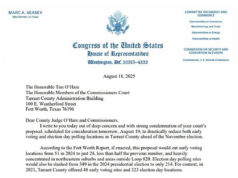But at least Static is not alone – spaced here and there on the ramparts are its alterna-siblings, the alternative newsweeklies and other independent media outlets around the country that also do their damnedest to bring readers another viewpoint in one-daily-paper cities – to ask the uncomfortable questions that even excellent mainstream papers often leave unspoken. (Sometimes it’s easier, frankly, for little alternative papers like Fort Worth Weekly to feel pure: Ain’t no mega-advertiser putting the screws on us because we have no mega-advertisers.) Alternative newsweeklies, in fact, have been gaining in visibility and respect around the country in recent years, as increasing concentration of mainstream media ownership, demands for ever-higher profits and – not surprisingly – the increasingly fluffy quality of mainstream news have made readers long for something different.
So it was with quite a chill that Static read this week about the probable merger of the country’s two largest alternative newspaper chains. Yes, Virginia, even alternative papers are often owned by chains – the Weekly, in fact, was owned by New Times, one of the merger partners in question, for about a year, a while back. (Fortunately, we were quickly spit back out into freestanding status like a bit of indigestible gristle. The Weekly’s national advertising, however, is still handled by a New Times-owned company.)
In this case, according to a California alt-weekly not owned by either chain, New Times and Village Voice Media are considering a merger that would create an 18-paper company – probably not great news for those seeking more free voices in this country. But here’s the really scary part of writer Tim Redmond’s story in the San Francisco Bay Guardian: The new chain, if created, would be “controlled to a significant extent by venture capitalists.” (Note: The Guardian has a lawsuit going against New Times.)
Holy Mother Jones. According to Redmond’s sources, the merger agreement would give New Times a one-vote majority on the new board if their banker votes with them. On the other hand, if the bankers from both teams got together, and convinced one Village Voice Media director to vote with them – well, let’s just say that a horse put together by a committee is nowhere near as ugly as a newspaper company run by a bunch of vulture capitalists.
Since the new company could serve up the 25-to-40-year-old market in cities from New York to Miami to Los Angeles (and Dallas), those papers would become much more attractive to mainstream advertisers. That could be great – as long as the new company were under the journalistic control of the current New Times honchos, who, other virtues or vices aside, believe deeply that advertising should not influence the news pages.
But how long will that be true?











